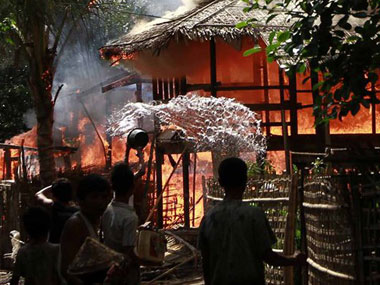Intl. community must share Rohingya’s responsibility: Expert

 A political analyst tells Press TV that the responsibility of supporting the minority Rohingya Muslims in Myanmar has to be shared by the international community.
A political analyst tells Press TV that the responsibility of supporting the minority Rohingya Muslims in Myanmar has to be shared by the international community.
The comments come after Rohingya organizations and activists around the world declared Nov. 8 a global day of action to draw attention to the ongoing plight of Muslims in Myanmar.
Press TV has conducted an interview with Sarnata Reynolds, the program manager for statelessness at Refugees International, to further discuss the issue.
What follows is an approximate transcript of the interview.
Press TV: I want to ask specifically about the reconciliation and reintegration of the Rohingyas in Myanmar itself? What are the prospects for that going forward especially considered we have heard that many Myanmaris do not in fact accept the Rohingyas as their own?
Reynolds: I am glad you brought this up. It is actually one of the great holes in this whole story. There is no question that the segregation that occurred in June meaning that the Rohingya who were forcibly moved from Sittwe town where they have lived for decades, if not for more or hundred years were pushed outside of town where originally it was set for their safety and security.
But five months on there is no discussion whatsoever of reintegration or basically allowing people to go home or go to the places for they once had homes if they were burned down and there are no discussions either coming from the international community certainly not from the government and certainly not from the local people or the local security about reconciliation.
It has to occur. These are two populations that have lived alongside each other for a very long time. There is no reason, the idea that is going to happen tomorrow is of course not reasonable but the fact that is not going to happen in a day or a week or even a year is no reason not to begin the process now.
And in fact the international community should be demanding this of Myanmar’s government saying that we need to see a road map with clear measures so that we know that this reconciliation will occur and a permanent segregation of the Rohingya people will not.
Press TV: I also wanted to ask about the topic of the international community, you know when this Rohingya plight issue first came up many of the neighboring countries tried to downplay the issue out of fear obviously of having the refugees coming in such as Bangladesh even Pakistan I remember reading in the Pakistani media, then essentially trying to downplay the entire issue. How much of an onus do these countries have as well in this issue vis-à-vis citizenship, etc.?
Reynolds: Well this is, I mean the situation of the Rohingya it is a regional issue whether they were in countries and the region in general wants to admit it or not. The original persecution is the responsibility of the Myanmar’s government. Regional governments in the region say that and it is absolutely fair.
The reality is however that people are fleeing persecution and they are fleeing hunger, they are fleeing violence and they are fleeing the fact that they have zero human rights that no one will protect them.
So when they take boat voyages or even wait across the Naf River, they need to be accepted, they need to be provided with refuge. Bangladesh in particular has been the recipient of hundreds of thousands of Rohingya over the last few decades but only less than thirty thousand are recognized as refugees who are given access to the UN refugee agency and other humanitarian agencies. The rest are basically on their own and makeshift camps in terrible conditions and of course always at the threat of deportation and arrest.
Bangladesh is understandably concerned about what is going on and understandably upset that it has been taking on the responsibility of refuge with very little assistance from the international community and certainly a little assistance from its neighbors who will also see large influxes of the Rohingya as the months go on because the situation in Myanmar is so bad.
So a huge message that needs to go into the region is certainly nothing new but that they have to keep the borders open for the fleeing Rohingya and the larger message to the international community is that responsibility has to be shared, that this region cannot handle the responsibility alone and that certainly the responsibility begins in Myanmar but that there has to be a discussion, a dialogue that is both regional and international because ultimately the Rohingya have a right to nationality and how they are going to acquire nationality is a larger discussion that has to be had in a larger arena.







